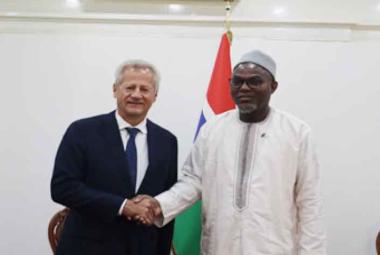By Fatou Sanneh
At the heart of the rapid evolution of the media landscape is technological advancement. It is reshaping how we consume and interact with news. Whether is AI-generated content or immersive storytelling experiences, the media industry is indeed fully embracing the innovation. Artificial Intelligence (AI) in particular, is an emerging theme in the industry that has stakeholders - policy makers, practitioners, and other actors - talking and debating about its potential, implication and impact. It does become a dominant theme in global media and communication fora. Such was the case during the recently concluded 2nd edition of Global Media Congress held in Adu Dhabi, United Arab Emirates from 14th to 16th November 2023.
The event opened with a mesmerizing showcase of ground-breaking technologies, driven by Artificial Intelligence, vividly illustrating how innovations are reshaping the future of media.
Thus, sessions that delved into the nexus between AI and media became my instant attraction and interest.
For a more rounded perspective on the topic of AI during the prestigious Abu Daha forum, I had the privilege to interview and chat with some participants on the recurrent AI question – Is it a blessing or a cause for worry?
Muhammed Kabir Cham, a Senegalese delegate of the congress and student of mass communication at the Al Gasimia University in UAE, is a strong enthusiast of Artificial Intelligence. Responding to the question of whether AI can never replace human power, he said the emerging technology will ease the work workload on human beings.
Fafa Ceesay, a Gambian studying mass communication in UAE, who also attended the forum, had this to say: “Emerging technologies could be used positively to connect people from all over the world with the stories that matter”.
Despite the optimistic views of the two delegates, there remains a lingering concern that with the technological advancement, come risks on editorial integrity and the rise of fake news and unending bias in the media industry.
Co-founder and Creative Director of Anyi Studio, Noah Beilin acknowledged that “technological advancements in the media are reshaping our information landscape, offering unprecedented opportunities for more engagement”, and that it provides “lots of amazing tools for journalism which is enhancing creativity and making work easier”.
However, he advised industry stakeholders to strike a balance between innovation and ethical considerations to ensure the public’s trust in media remains intact.
“As the media embraces these technological leaps, the unfolding story should not only enchant their audience but also strike a balance between amusement and responsibility. The path ahead for the media industry involves navigating this dynamic landscape, where innovation and ethical journalism must go hand in hand to forge a credible and trustworthy future”.
Mr Noah Beilin in an apparent summation of his global view on the technology-media nexus, was further quoted as saying, “In a world interconnected by technology, the responsibility of global media is paramount. As we navigate the digital age, ethical considerations must guide our path to ensure that media remains a force for truth, justice, and positive transformation.”
Finally, the afore-expressed views from the Abu Dhabi talks, it is ostensible that technological innovation, AI in particular, is generally welcomed and the imagination that it comes to replace humans will remain an illusion. Experts, and keynote addressers at the meeting largely posited that human intervention will remain an inevitability for AI and other forms of emerging technologies to effectively function.








